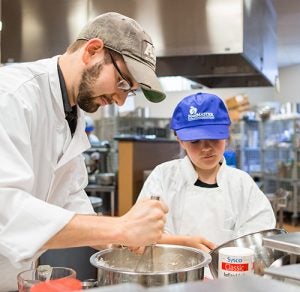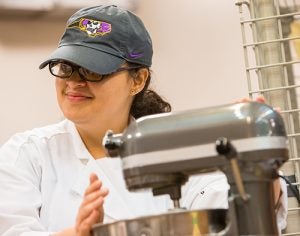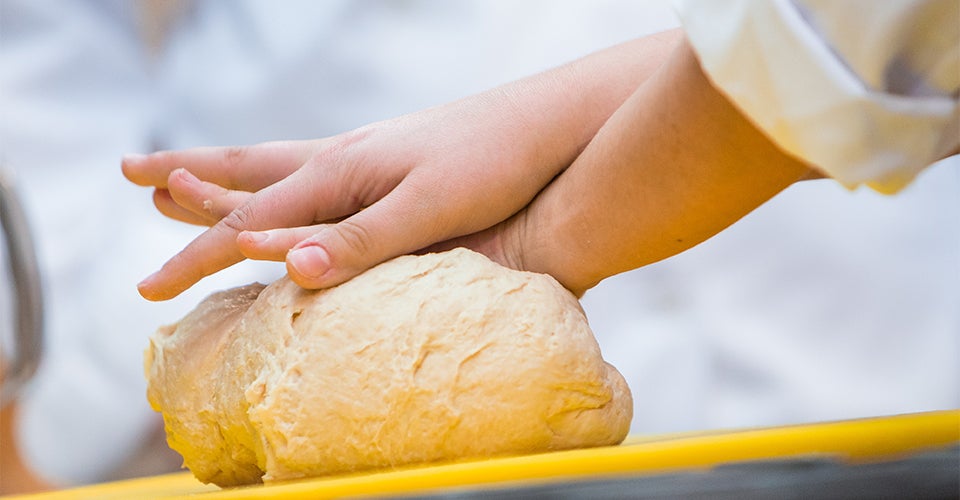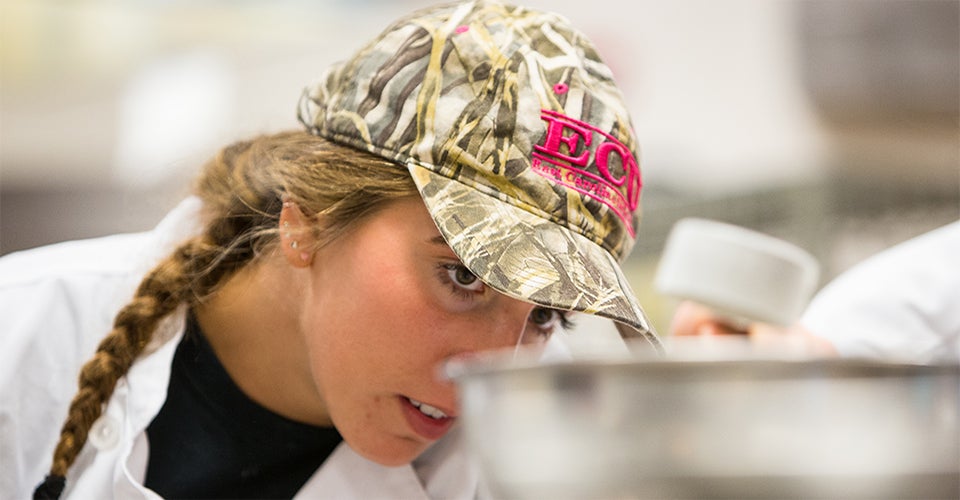FOOD FOR THOUGHT
FoodMASTER program marks 10 years at ECU
FoodMASTER, an initiative that uses food and cooking to teach science and math concepts, has grown from an idea to a wide-ranging collaboration between partners on campus and in the community, region and nation during its 10 years at East Carolina University.
The underlying principle of the program is to create interest and relevance for learning science by using food and cooking as a tool, said Melani Duffrin, the professor of nutrition science who brought the idea to ECU.
“It was a small pilot program in southeast Ohio, and I brought it here when my husband and I came to ECU,” she said. “But really it grew here into what it is today.”
Upon receiving funding from the National Institutes of Health Science Education Partnership Award (SEPA), the initiative began with a small-scale test in North Carolina and Ohio to research the potential impact and lay the groundwork for future efforts.
Food makes an ideal learning platform because children and adults alike interact with food everyday, she said; “without even realizing it, everyone is exposed to dozens of mathematic and scientific concepts every time we prepare food.”

Jared Lowe and Makayla Kean whip up a batter.
One of the most popular exercises is the first chapter in the curriculum for grades 3-5.
“One of the teachers’ favorites is weights and measures,” said Duffrin. “It introduces their kids to fractional math in a really visual, hands-on way. They like it because it engages the students; they are learning what this looks like, how do I level this off, what does a cup of this look like, versus something else. They learn about mixing, about baking, and of course most of our activities use healthy foods, but in this particular instance they get to eat some cookies, so that’s a bonus.”
Each chapter includes lessons and activities, as well as proficiency questions so teachers can gauge their students’ grasp of the concepts. There are also take-home activities that the students can try with their parents.
All of the materials are available for free online, and Duffrin said she is committed to keeping it that way. Curriculum resources have been developed for grades 3-5 and grades 6-8, and new short-form activities for after-school and community programs are in the works. In addition to SEPA, the U.S. Department of Agriculture has provided funding for the program, which is housed in ECU’s College of Allied Health Sciences.
More than 90 teachers in North Carolina were trained using the materials this year in partnership with the N.C. Association for Biomedical Research, and professional development workshops for teachers have been held across the country.
Mary White, a seventh-grade science teacher at A.G. Cox Middle School, said her students love the activities.
“My students would ask me, ‘When are we doing another one of those food labs?’” she said. “They looked forward to them and would volunteer to help me set them up and clean up after.”
Graduate student Allender Lynch, who has been involved with the program for three years, said it makes math and science more approachable because everyone loves food.
“By being hands-on, it is an overall fun and exciting experience for everyone,” she said.
The FoodMASTER program works with a number of partners including ECU Family Medicine and the Pediatric Healthy Weight Clinic, the College of Education’s Center for STEM Education, Boys & Girls Clubs, museums and camps.
Nutrition science students who excel in Duffrin’s food science laboratory may end up volunteering with her annual summer camp, which is held in conjunction with Love a Sea Turtle’s camp, or developing their own programs for community events.
“FoodMASTER has also provided opportunities that many children in eastern North Carolina would not have otherwise experienced,” said Lynch. “During summer camp, the children were able to do a variety of activities such as baking cookies using solar energy, making smoothies in a blender powered by a bicycle, dirt biking, kayaking and much more.”

Caitlin Bullard operates a mixer during a lab activity.
Many of the college students who have been involved with the program have been inspired to pursue related careers, Duffrin said. Ashley Roseno has worked with FoodMASTER for the past seven years and is now pursuing a doctoral degree.
“I have worked my way from an undergraduate research assistant to the project coordinator over the years and know that if it were not for this program, I would not currently be pursing a Ph.D. in educational research and policy analysis,” Roseno said. “I believe science education is essential for the success of today’s youth, and by engaging other professionals, I can build relationships and connections that will ultimately allow me to contribute to the field.”
Lynch is applying to the University of Mississippi to pursue doctoral studies under Duffrin’s former doctoral advisor, Dr. David Holben. She said Duffrin and Dr. Virginia Carraway-Stage, assistant professor of nutrition science, have used FoodMASTER as a vehicle to reach out to students and help them find their way.
“I have grown so much professionally and developed skills that I am not sure I would have otherwise obtained,” Lynch said. “Furthermore, while working with FoodMASTER I have found my interests and passions, which I am now pursuing.”
Duffrin said the program’s goals for the next 10 years are to establish an endowment to make the program self-sustaining, and to form a regional partnership throughout the southeastern United States.
“We are partnering with six universities – Ole Miss, Auburn, University of Alabama-Birmingham, Georgia State, Georgia Southern and the University of South Carolina – to create what we are calling a Deep South Network,” she said. “We want to send a clear message to the nation that science education is important to communities, not only to have an educated population, but also to address health disparities, and FoodMASTER is one potential way to do that.”
Resource materials and additional information can be found at www.FoodMASTER.org.

The FoodMASTER program is designed to promote science and math education as well as community health.
